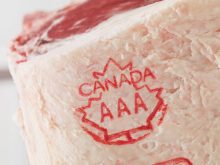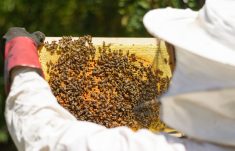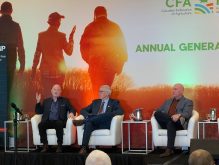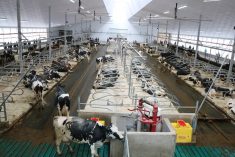The United States showed a weak hand in defending its country-of-origin labelling rule before a recent World Trade Organization dispute panel, says a Canadian Cattlemen’s Association official.
John Masswohl, CCA’s government and international relations director, said Canada outscored the U. S. in arguing against COOL during oral hearings earlier this month in Geneva.
U. S. trade officials defended their rule by saying COOL only informs consumers and does not hurt Canadian cattle and hogs economically.
But Masswohl called the U. S. arguments “disingenuous” and suggested their officials realize it.
Read Also

Trade uncertainty, tariffs weigh on Canadian beef sector as market access shifts
Manitoba’s beef cattle producers heard more about the growing uncertainty they face as U.S. tariffs, and shifting trade opportunities, reshape their market.
“They probably know that they have a losing hand,” he said after speaking to a Sept. 21 Manitoba Cattle Producers district meeting. “What they’re trying to defend is offside.”
The Sept. 14-15 oral arguments were the first step in settling a dispute by Canada and Mexico against the controversial U. S. rule which officially took effect in its final form March 16, 2009.
Canada and Mexico argue COOL discriminates against their hogs and cattle because it forces U. S. packers to segregate imported animals, resulting in extra costs and price discounts.
Masswohl said U. S. arguments during the hearing, which he and other CCA officials attended, were twofold: COOL only tells consumers where their food comes from and financial losses to Canadian livestock result from other market forces, not the rule itself.
According to the U. S. argument, COOL doesn’t force anyone either to segregate Canadian livestock or not to buy them at all, said Masswohl.
But he said Canada produced evidence, including written statements from U. S. buyers and packers, to show COOL does cause those things to happen.
As a result, Canadian cattle sold in the U. S. are worth $20 to $40 a head less than they would be without COOL, according to CCA.
“It’s very clear that the connection is there between COOL and how the market responded,” Masswohl said.
As an observer, Masswohl said he was “pretty pleased” with the way Canada argued its case.
Further hearings are scheduled for December. A ruling is expected by July 2011.
That ruling, whichever way it goes, will almost certainly be appealed, likely pushing a final outcome to the summer of 2012.
Even if Canada wins, the result could by a pyrrhic victory because of the cost to the livestock industry. Masswohl said CCA’s legal fees are around $100,000 a month, which producers ultimately pay. [email protected]














